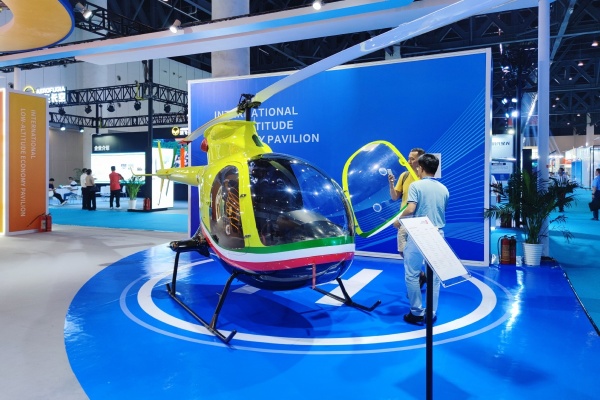
- Home
- Media Center
-
Events
- Wuzhen Summit
- Regional Forums
- Practice Cases of Jointly Building a Community with a Shared Future in Cyberspace
- World Internet Conference Awards for Pioneering Science and Technology
- The Light of Internet Expo
- Straight to Wuzhen Competition
- Global Youth Leadership Program
- WIC Distinguished Contribution Award
- Membership
- Research & Cooperation
- Digital Academy
-
Reports
- Collection of cases on Jointly Building a Community with a Shared Future in Cyberspace
- Collection of Shortlisted Achievements of World Internet Conference Awards for Pioneering Science and Technology
- Reports on Artificial Intelligence
- Reports on Cross—Border E—Commerce
- Reports on Data
- Outcomes of Think Tank Cooperation Program
- Series on Sovereignty in Cyberspace Theory and Practice
- Other Achievements
- About WIC
- 中文 | EN

Technology pushing low-altitude aircraft

Visitors view a helicopter during the 2024 Chengdu International Low-altitude Equipment and Services Expo, which opened on Thursday in Chengdu, capital of Sichuan province. [Photo/chinadaily.com.cn]
China's innovative breakthroughs in low-altitude aircraft are driving the country's urban air mobility sector to undergo development at such an unprecedented pace that it may one day lead to profoundly reshaping people's means of travel and experiences in areas such as sightseeing, logistics and emergency rescue, industry insiders said.
They made the remarks at the three-day 2024 China (Chengdu) International Low-altitude Economic Partnership Conference and the 2024 Chengdu International Low-altitude Equipment and Services Expo, held in Chengdu, capital of Sichuan province, last week.
"China lags behind developed countries in traditional general aviation, but the development of electric aircraft has given the country an opportunity to overtake its competitors in the low-altitude economy," said Guo Liang, CEO and chief scientist of Aerofugia, a subsidiary of Chinese automaker Geely Technology Group.
Guo said China's world-leading new energy electric vehicle industry has provided solid industrial support for the development of electric vertical takeoff and landing aircraft, or eVTOL, as 80 percent of its supply chain overlaps with that of electric cars.
Guo said his company aims to obtain an airworthiness certificate for its self-developed AE200, a five to six-seat manned tiltrotor eVTOL aircraft, by the end of next year or early in 2026, and deliver the first batch of aircraft to clients for trial commercial operations in the first half of 2026.
He believes eVTOLs are more likely to be used for business travel in the early stages as they can significantly reduce travel time, and after the industry matures, the cost will be significantly reduced to a range that is affordable for ordinary people.
"The cost of taking an air taxi may be two to three times that of ground transportation, but the travel efficiency can be up to five times," he said.
He mentioned that due to the shortage of emergency helicopters in China, people's first response to sudden illness or injury is to call for an ambulance. In the future, eVTOLs are expected to play a crucial role in this area. And eVTOLs can also provide fast connections between scenic spots in areas with complex terrain, thereby changing people's travel habits and improving their tourism experiences, he added.
Xu Huawei, public relations director of Sichuan Tengden Sci-tech Innovation Co Ltd, said the application of unmanned aerial vehicles in artificial weather modification is booming as extreme weather conditions have become more frequent in recent years.
The company has signed cooperation agreements with several provinces and autonomous regions to conduct experimental flights and normalized operations for weather modification, he said.
The emerging large-scale unmanned and smart cargo aircraft will also further improve China's logistics efficiency and reduce costs, he said.
Ren Bin, chairman of Chengdu-based industrial UAV manufacturer JOUAV, said UAVs, equipped with all kinds of sensors, will empower comprehensive management in various fields such as transportation, forest inspection and urban management.
"Low-altitude digital economy, rather than low-altitude transport and logistics, will probably be the main business form and growth point of low-altitude economy in the next five to 10 years," he said.
Cheng Chengqi, a Peking University professor and a member of China's air traffic management advisory committee, proposed to build a low-altitude three-dimensional traffic signal system to empower low-altitude traffic management and safe navigation.
"Similar to how we use car navigation systems, once the start and end points are set, this system can plan feasible flight routes for low-altitude aircraft," he said.

The World Internet Conference (WIC) was established as an international organization on July 12, 2022, headquartered in Beijing, China. It was jointly initiated by Global System for Mobile Communication Association (GSMA), National Computer Network Emergency Response Technical Team/Coordination Center of China (CNCERT), China Internet Network Information Center (CNNIC), Alibaba Group, Tencent, and Zhijiang Lab.





